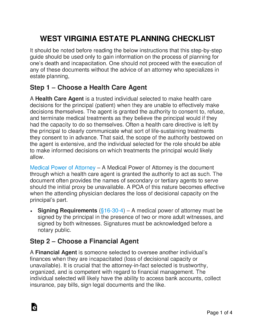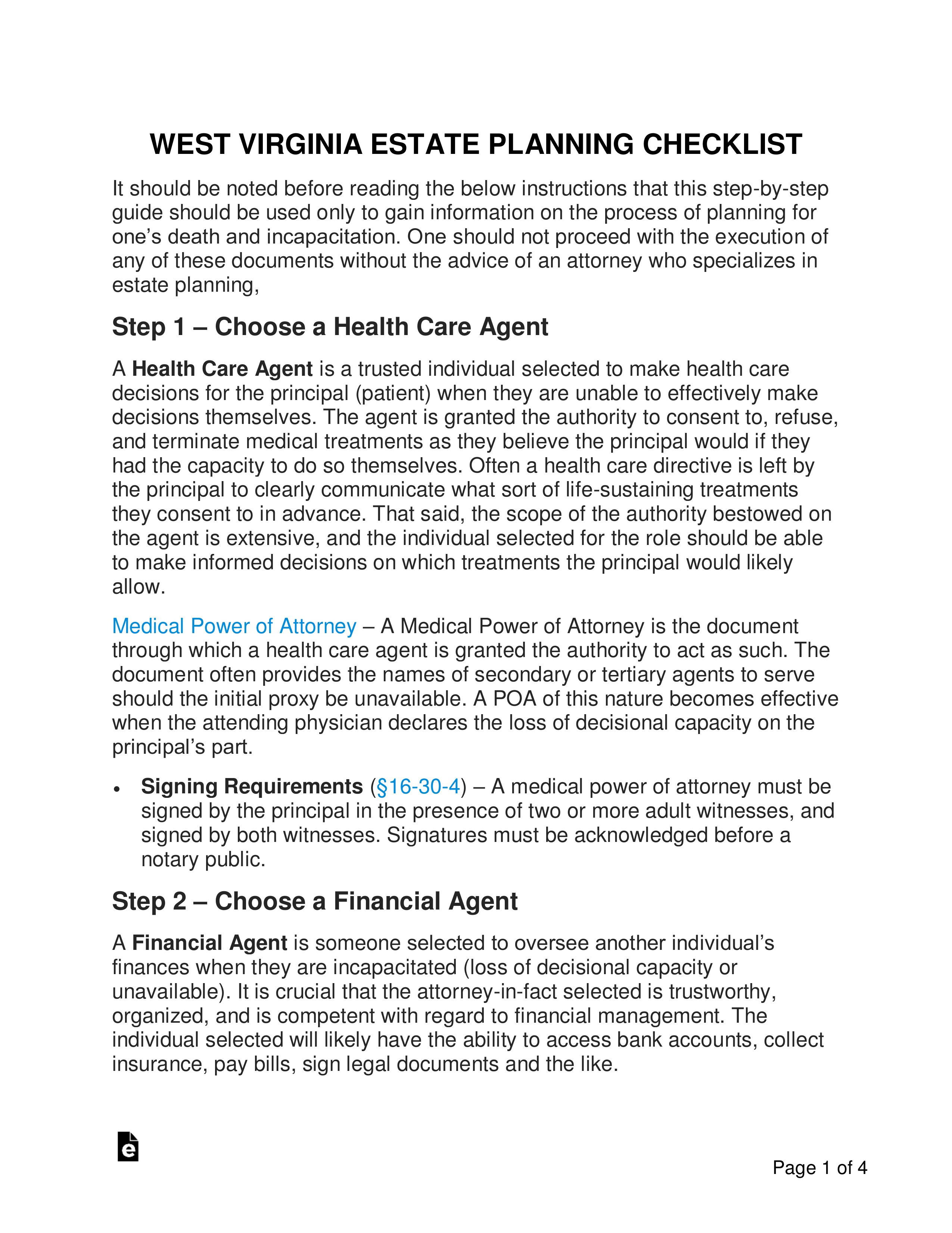Updated March 05, 2024
A West Virginia estate planning checklist is a list of steps and documents that a resident can use to prepare their estate for distribution following their passing. When securing one’s estate, it is wise to first ensure that one’s finances and healthcare are in good hands should the loss of decisional capacity occur. The documents necessary for the assignment of attorneys-in-fact are the Medical Power of Attorney and Durable (Financial) Power of Attorney. The forms used to designate beneficiaries and assign assets are the Last Will and Testament (‘Will’) and Revocable Living Trust.
How to Create an Estate Plan in West Virginia (6 steps)
- Choose a Health Care Agent
- Choose a Financial Agent
- Create List of Assets
- Choose and Contact Beneficiaries
- Execute Estate Planning Document(s)
- Store Documents
It should be noted before reading the below instructions that this step-by-step guide should be used only to gain information on the process of planning for one’s death and incapacitation. One should not proceed with the execution of any of these documents without the advice of an attorney who specializes in estate planning.
1. Choose a Health Care Agent
A Health Care Agent is a trusted individual selected to make health care decisions for the principal (patient) when they are unable to effectively make decisions themselves. The agent is granted the authority to consent to, refuse, and terminate medical treatments as they believe the principal would if they had the capacity to do so themselves. Often a health care directive is left by the principal to clearly communicate what sort of life-sustaining treatments they consent to in advance. That said, the scope of the authority bestowed on the agent is extensive, and the individual selected for the role should be able to make informed decisions on which treatments the principal would likely allow.
Medical Power of Attorney – A Medical Power of Attorney is the document through which a health care agent is granted the authority to act as such. The document often provides the names of secondary or tertiary agents to serve should the initial proxy be unavailable. A POA of this nature becomes effective when the attending physician declares the loss of decisional capacity on the principal’s part.
- Signing Requirements – A medical power of attorney must be signed by the principal in the presence of two or more adult witnesses, and signed by both witnesses. Signatures must be acknowledged before a notary public. [1]
2. Choose a Financial Agent
A Financial Agent is someone selected to oversee another individual’s finances when they are incapacitated (loss of decisional capacity or unavailable). It is crucial that the attorney-in-fact selected is trustworthy, organized, and is competent with regard to financial management. The individual selected will likely have the ability to access bank accounts, collect insurance, pay bills, sign legal documents and the like.
Durable (Financial) Power of Attorney – This power of attorney document is used to grant power of attorney to a financial agent. As the document isn’t always used in anticipation of incapacitation, it may be necessary to declare that it be effective only upon the loss of decisional capacity.
- Signing Requirements – A financial power of attorney must be signed by the principal and acknowledged before a notary public.[2]
Subjects often managed by Agent:
- Real Property
- Tangible Personal Property
- Stocks and Bonds
- Commodities and Options
- Banks and Other Financial Institutions
- Operation of Entity or Business
- Insurance and Annuities
- Estates, Trusts, and Other Beneficial Interests
- Claims and Litigation
- Personal and Family Maintenance
- Benefits from Governmental Programs or Civil or Military Service
- Retirement Plans
- Taxes
3. Create List of Assets
4. Choose and Contact Beneficiaries
5. Execute Estate Planning Document(s)
With the beneficiaries selected, the administrative roles assigned, and the current assets list completed, the estate owner can being drafting their estate transfer document. Depending on the size of the estate and the complexity of the document, it may be necessary to contact an attorney for assistance. Generally, one chooses from the following two (2) estate planning tools:
Last Will and Testament (‘Will’) – This is the most commonly used document for transferring the ownership of assets and property following one’s death. It is a less complex document and generally costs less to create; however, it must pass through probate court before the beneficiaries can receive their inheritance (a process which can take well over a year to complete). A Will becomes effective following the death of the testator (creator).
- Signing Requirements – Must be signed by the principal before two (2) adult witnesses who must also sign.[3]
Living Trust (Revocable) – A trust is an instrument used for the same purpose as a Will only it becomes effective immediately following signing and requires more work upfront for the grantor (creator). Following its creation, the grantor must transfer assets under the trust’s ownership. A trustee is designated to oversee the management of the entity (often the grantor) and an individual is designated to distribute the assets therein to the named beneficiaries following the grantor’s death. This distribution process occurs outside of probate court and therefore costs considerably less money and wastes comparatively no time.
- Signing Requirements – There are no statutory signing requirements for a Trust document. However, the principal and trustees will most likely be required to sign.
6. Store Documents
West Virginia Estate Planning Laws
- Advance Directive – CHAPTER 16, ARTICLE 30. WEST VIRGINIA HEALTH CARE DECISIONS ACT.
- Durable Power of Attorney – CHAPTER 39B. UNIFORM POWER OF ATTORNEY ACT.
- Last Will and Testament – CHAPTER 41. WILLS.
- Living Trust (Revocable) – CHAPTER 44D (UNIFORM TRUST CODE)


